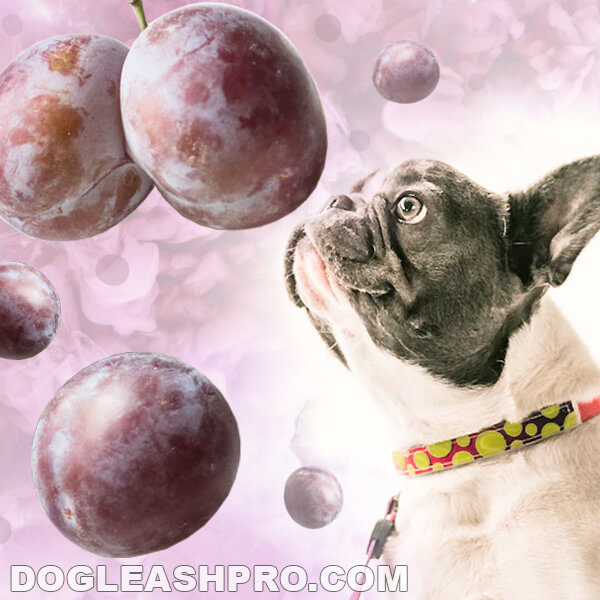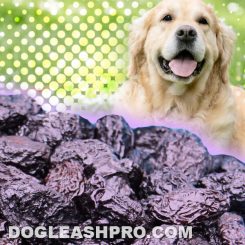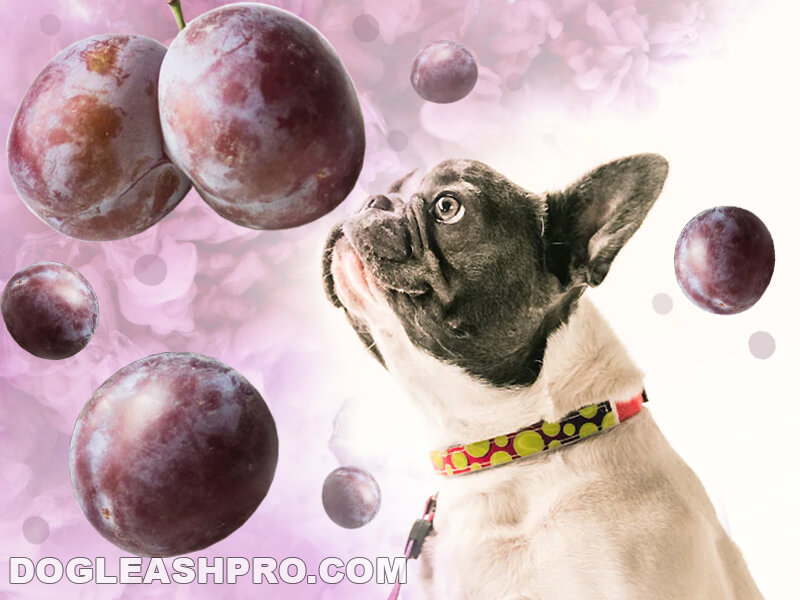
Can dogs eat Plums? Yes, dogs can eat Plums as the Plum’s flesh isn’t toxic to dogs. However, dogs should only have small amounts of Plums in moderation since Plums have high sugar content. Keep the Plum pit away from dogs as it contains cyanide which is poisonous to our canine friends. The Plum pits are also sharp which can cause cuts in the dog’s mouth, they can become a choking hazard, and cause obstruction in the dog’s digestive tract.
Are Plums one of your favorite sweet fruits during the summer and fall season? This juicy sweet purple fruit can be found in many pet owners’ homes. I bought some Plums yesterday and my dog was very curious. Before giving my pooch the Plum, I wondered, can my dog eat plums, or is it best for her to stay away?
In addition to the Plum pit, there are other parts of the Plum plants that your dogs should avoid which we will discuss below. Be sure to read this article before feeding Plums to your pooch.
Table of Contents
Can dogs have Plums?
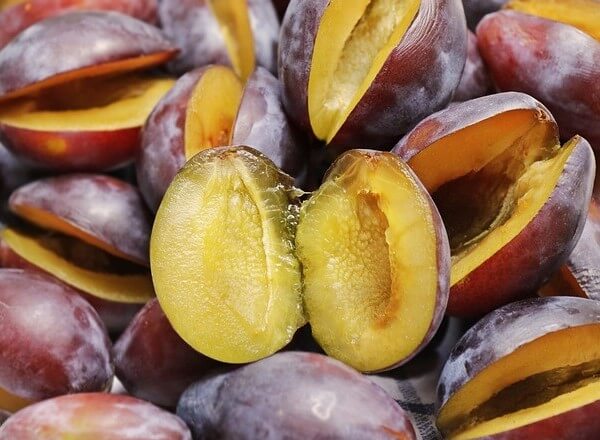
Dogs can have Plums, however, it’s important to note that Plums can both be good and bad for dogs. Should dogs eat Plums? Since the Plums’ flesh does have high sugar content, there are plenty of other doggy treats that are better to feed your dogs than Plums.
Let’s explore further into this here.
Are Plums good for dogs?
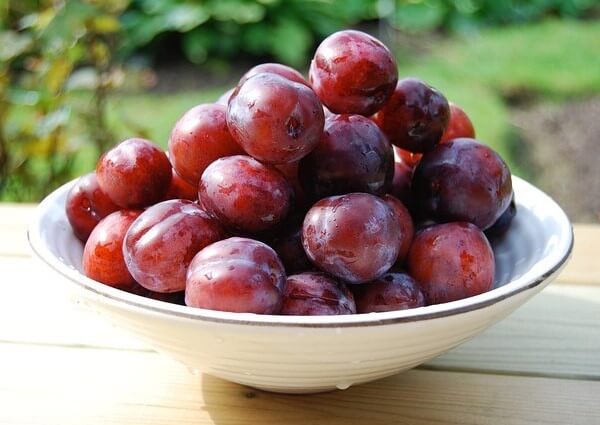
Plums can be good for dogs in moderation. Are Plums safe for dogs? The ripe Plum flesh is not toxic to dogs so that is the only part that is safe for dogs to eat. Are Plums ok for dogs? It should be ok if your pooch eats just a few slices of the Plum. Moderation is key here. It’s best not to feed your pup too much and too frequently since ripe Plum is very sweet.
The high sugar content in Plums is not good for dogs that are overweight, have pancreatitis, or are diabetics. Eating too many sugary fruits and food can cause a spike in their blood pressure, which should be avoided.
Many store-bought Plums are safe for doggy consumption since they are usually ripe and do not come with the stem, root, or flower. However, since the Plums do have pits inside, make sure to remove the pit and cut the Plum into small slices before allowing your dog to eat them.
Are Plums bad for dogs?
Plums can be bad for dogs if your furry friends accidentally ate some parts of the Plum plants that are toxic to dogs. Are Plums bad for dogs to eat? Only if your dog gets into the Plum’s pit, stem, flower, and root. We’ll discuss this more in-depth here.
Are Plums dangerous for dogs?
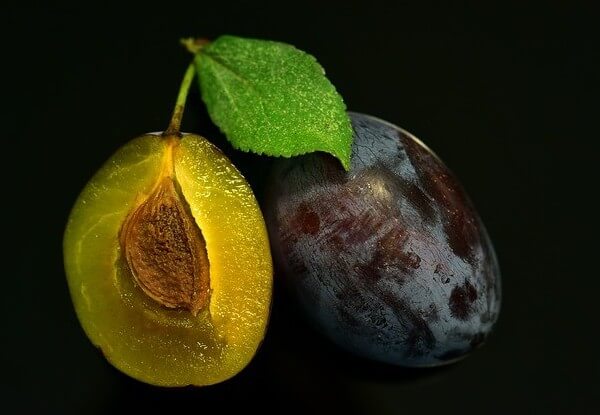
As mentioned above, the pit of the Plum is dangerous to dogs. Because the Plum pits have sharp ends, the pits can accidentally cause tears and cuts inside your dog’s mouth and tongue which can lead to bleeding. Also, if your dogs chew on the pit or your dog just ate a Plum pit, they are at risk of cyanide poisoning. When the cyanide is released, it can be harmful within several minutes.
Signs of cyanide poisoning in dogs include:
- Difficulty breathing or breathing very fast.
- Salivation.
- Paralysis (in severe cases).
- Convulsions (in severe cases).
When to contact the vet
If you notice any of these signs and symptoms, you’ll want to call your vet right away and bring your dog in to see the vet as cyanide poisoning requires immediate attention. Be sure to stay calm but do not wait too long.
The veterinary professional may ask you what part of the Plum your dog consumed and whether your dog swallowed a Plum pit. Before you leave the house, take a look to see which part of the Plum your dog has ingested. If the pit is still intact, then your pooch will likely be ok.
Are Plums toxic to dogs?
If you grow Plum plants in your backyard, make sure to keep them away from your dogs as the plant’s stem, flower, and roots are very toxic to dogs. It’s best to grow the Plum plant in a corner of your yard and put up a fence. This will prevent distracted or curious dogs from getting near the Plum plant.
This is important because the Plum plant’s stem, flower, and roots contain several toxins such as the following that is very dangerous to dogs:
- Amygdalin.
- Cyanide.
- Cyanogen.
- Prunasin.
Even a small bite or taste of any of these parts can cause your K9 pals to vomit, have tremors and upset stomach, as well as difficulty breathing. When these toxins enter your dog’s bloodstream, your pooch will suffer from Plum poisoning and may experience kidney failure.
Can dogs eat Plums without the stone?
Yes, dogs can eat Plums without the stone, but not in large quantities. Generally, Plums are a good source of fiber, antioxidants, and vitamins. Hence, they are beneficial to your dog’s overall health.
However, dogs should not eat Plum stones because they contain amygdalin, which can be toxic to dogs if ingested in large quantities.
The amygdalin contained in Plum stones breaks down into chemical cyanide, which can cause various dangerous side effects, including vomiting, diarrhea, seizures, and even death.
Besides, Plum stones can also pose a choking hazard or cause intestinal blockages if ingested whole.
While a single Plum stone may not cause significant harm to your K9 friends, it’s best to keep all Plum stones away from your dog and only offers them the flesh of the Plum.
This is the safest and ideal treat for canine consumption if they enjoy eating Plums.
So, are Plum stones poisonous to dogs?
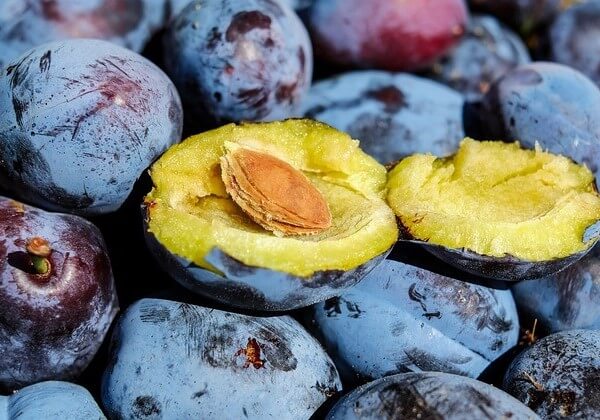
Responsible dog owners should always slice the Plum into small chewable pieces and remove the Plum stones or pits so their canine friends can eat the Plum safely.
Avoid giving your pooch the entire Plum to eat. This is dangerous in two ways.
- If your four-legged friends try to eat the entire Plum, they may choke from it because the Plum is too big for their tiny throat. Most dogs do not chew their food and just swallow their food.
- For dogs that chew through the Plum, they’ll notice the pit and will start to chomp down on the pit as well. This is dangerous as the pit is not only a choking hazard as well, but it contains a chemical called cyanide that is toxic to dogs.
If the entire Plum or Plum pit is swallowed and enters the body, it can then cause intestinal blockage and this can be fatal to dogs.
Here’s what can happen to your precious pooch if they accidentally ate the entire Plum:
- Difficulty breathing if the Plum or Plum pit gets stuck in the throat or esophagus.
- Vomiting is the body’s natural way to get rid of the toxic.
- Diarrhea.
- Upset stomach.
- Loss of appetite.
- Feeling lethargic.
- Skin irritation from the toxic chemical, cyanide.
- Coma (in severe cases).
A user from Reddit shared that if your pup swallowed a Plum stone whole, be sure to consult your veterinarian immediately.
She recalled that, “Years ago, my toy poodle swallowed a door stopper (a little smaller than a plum pit) and almost had to have surgery to remove it. She was really sick — lethargy, throwing up bile.”
Another Reddit user said that calling the vet as soon as possible is crucial, stating, “I think a whole plum pit can get stuck somewhere in her intestines which is bad. You should call the vet before that happens. If you don’t call the vet soon she might have to get surgery to remove it.”
Additionally, if you suspect your dog has cyanide or Plum poisoning, be sure to contact your vet immediately and take their advice and instruction.
Your vet may ask you to bring your dog in and they may administer IV drip or sodium nitrate to help remove the cyanide and other toxins from your pup’s bloodstream.
Are Plums poisonous to dogs?
As you can see, Plums are only poisonous to dogs if your precious pooch accidentally eats or chews on the Plum’s pit, stem, flower, and root. Many veterinary professionals highly advised dog owners to avoid feeding their pooch Plums because of the pit. However, if you’re careful and you only give your canine friends the flesh of the Plums in moderation, then Plums are not poisonous to dogs.
Handy Hint: Are you thinking about feeding your K9 pals fruits and vegetables? Before you do, make sure to prepare it properly. Vegetables like Jicama require proper preparation before serving it to your pooch. Check out Can Dogs Eat Jicama? to find out if it is safe for doggy consumption.
Can Yorkies eat Plums?
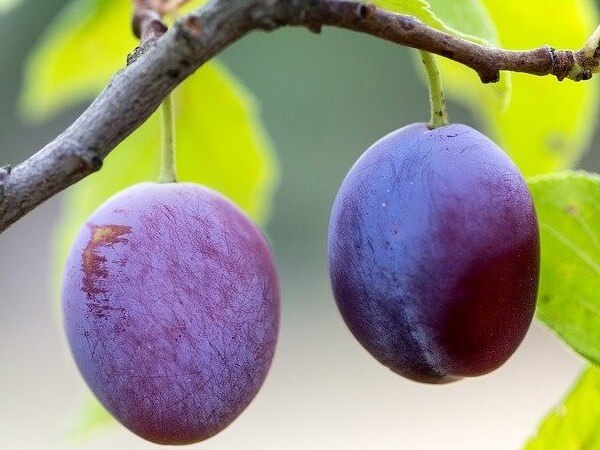
It’s best for Yorkies to eat just a tiny bite of the Plum’s flesh. Since the Plum’s flesh is high in sugar, it can be a lot of sugar intake for a small dog breed like the Yorkies. Be sure to properly prepare the Plum first before feeding it to your Yorkie, which includes removing the pit.
Since Yorkies are small, the pit can be a choking hazard if accidentally swallowed. The pit can also get stuck in the Yorkie’s intestines and cause intestinal blockage. For this reason, it’s crucial that Yorkie owners give just a slice of the Plum’s flesh to their dog and keep the pit away.
Are dogs allergic to Plums?
Some dogs may be allergic to Plums because Plums do contain birch pollen. If you know your pooch has a birch pollen allergy, avoid feeding him Plums.
Fun Fact: Jackfruit also contains birch pollen. Find out if dogs can safely eat Jackfruit by checking out this article, Can Dogs Eat Jackfruit?
Dogs and Plums
Can dogs eat Plums and peaches?
Dogs can eat Plums and peaches if the pit is removed. Both Plums and peaches are considered stone fruits. Before feeding your furry family members Plums or peaches, make sure to remove the pit first and only feed them the flesh.
If there are stems, leaves, or roots attached to the Plums or peaches, please remove them and wash the Plums. This is crucial because the leaves, stems, and roots of the Plums or peaches are toxic to dogs.
Can dogs eat dried Plums?
Dogs can eat dried Plums in small amounts or in moderation. A single small slice of dried Plum should be fine for dogs. However, avoid feeding your dogs too many dried Plums because they are high in fiber and sugar. Both of these combinations can shock your canine friend’s digestive system.
The dried Plums usually mean that the pits are already removed so it’s just the dried Plum flesh that is safe for doggy consumption.
Can dogs eat cherry Plums?
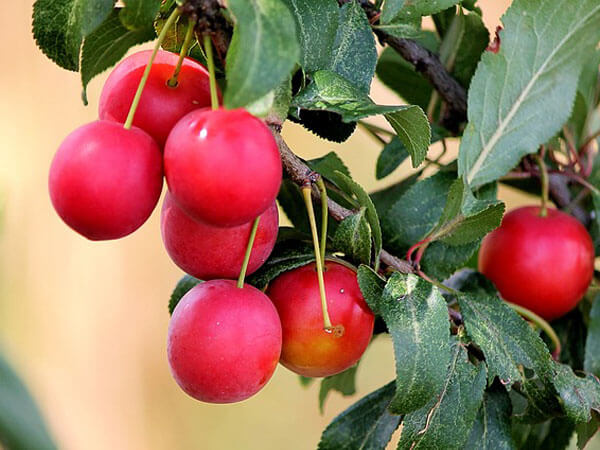
If you’re wondering, “Can my dog eat cherry Plums?” the answer is that dogs can eat cherry Plums in moderation and only if it is the flesh of the cherry Plums and not the pit, stem, flower, or roots. By moderation, we mean small amounts since cherry Plums do have high sugar content.
It’s not healthy for dogs to consume too much sugar as it can lead to weight gain, diabetes, and pancreatitis in dogs. For this reason, it’s best to only give your pooch a small slice as an occasional treat.
Can dogs eat Plums and nectarines?
Dogs can eat Plums and nectarines if the pit is removed from the Plums and the seeds are removed from the nectarines. Dogs should only eat the flesh of the Plums occasionally and as a treat. Avoid feeding your pooch too many Plums or nectarines as they are high in sugar.
Can dogs eat Plums or prunes?
Yes, dogs can eat Plums or prunes, but in moderation. Feeding your dog a large quantity of prunes or Plums can result in weight gain or even cause digestive issues.
Typically, prunes contain more sugar and can result in diarrhea or other digestive problems in some dogs.
In that regard, it is best practice to only feed your furry friends small pieces of Plums or prunes as occasional treats.
In addition, it is best practice to consult an experienced veterinarian if you have any concerns about your dog’s diet or in case of any allergic reactions after eating Plums or prunes.
Can dogs eat Plum skin?
Yes, dogs can eat Plum skin in moderation. The flesh of the Plum provides several nutritional benefits to dogs.
The Plum’s skin contains fiber suitable for a dog’s digestion. In addition, the Plums skin includes Vitamins C and K, potassium, and copper.
These nutrients support the immune function, promote the bones’ health, and aid the production of red blood cells.
However, if you feed your dog Plums skin, only do so in moderation. Generally, Plums are high in sugar, which can cause excessive weight gain and other harmful health effects on your four-legged friends.
Can dogs eat red Plums?
Absolutely! Dogs can eat red Plums but only in moderation after removing the Plum stone. Red Plums are a rich fiber source, promoting healthy digestion and regular bowel movements in dogs.
Additionally, red Plums contain vitamins and minerals such as vitamins C, K, potassium, and copper, which support immune function and promote healthy bones.
While dogs may eat red Plums, limiting their intake is best. Besides, dogs with health conditions such as obesity or diabetes should avoid eating Plums.
Can dogs eat black Plums?
Yes, dogs can eat black Plums. However, before feeding your canine friends black Plums, you’ll want to remove the stones first.
Moderation is essential, so limit the amount of black Plums you give to your four-legged friends.
Like the red plums, the black Plums contain high amounts of sugar, which, if dogs consume in high amounts, can cause diabetes and obesity.
In that regard, regulating the amount of black Plums fed to your dogs is essential.
Observe your canine friends for allergic reactions or symptoms; if you do notice any, report them to your veterinarian for immediate treatment.
Can dogs eat Plum flesh?
Yes, dogs can eat the flesh of the Plum. Plum fresh is the edible part of the Plum, which is often soft and juicy.
The Plum flesh can range in color from yellow, to red to black to purple, depending on the variety.
However, before feeding your dogs Plum fresh, make sure to remove the Plum stone first.
Note that the Plum stone can be a choking hazard so it can result in breathing difficulties, and can eventually lead to death.
Can dogs eat a Plum?
Yes, dogs can eat Plums in small amounts or as an occasional treat after removing the Plum stone.
However, they should not eat one whole Plum. That’s because one Plum fruit contains the following nutritional profile:
Plum Nutrition Facts (1 Plum Fruit, 66 grams)
| Name, Unit | Amount |
| Calories, cal | 30.4 |
| Protein, g | 0.462 |
| Total Fat, g | 0.185 |
| Carbohydrate, g | 7.52 |
| Fiber, g | 0.924 |
| Sugar, g | 6.55 |
| Calcium, mg | 3.96 |
| Iron, mg | 0.112 |
| Magnesium, mg | 4.62 |
| Phosphorus, mg | 10.6 |
| Potassium, mg | 104 |
| Vitamin C, mg | 6.27 |
| Folate, µg | 3.3 |
As we can see, just one (1) Plum fruit contains 30.4 calories, 7.5 grams of carbohydrate, and 6.55 grams of sugar. While this may not seem like a lot to us, this is too much calories, sugar, and carbohydrate for our little furry friends.
Therefore, it’s best to limit to just a few small pieces of Plum fruit for your K9 companions.
By providing your furry friends small pieces of the Plum, it can be a good source of nutrients and can support immune function, promote healthy bones and blood vessels, and aid in producing red blood cells.
In case of any health concerns about your dog’s diet, consult with your veterinarian.
Can dogs eat Plum seeds?
No, dogs should not eat Plum seeds or stones. Ideally, Plums are a type of stone fruit, which means they have a single, hard stone or pit in the center of the fruit.
The Plum stone contains amygdalin, which can break down into cyanide when ingested in large quantities and can be toxic to dogs.
Can dogs eat Plums and apricots?
Yes, dogs can eat both Plums and apricots but only in moderation. To give your dog Plums or apricots, wash the fruit with cool water and remove the pits before slicing it into small pieces.
Offer a small amount as a treat and monitor for any adverse reactions such as digestive issues or allergic reactions.
Remember to only offer fruit in moderation as a supplement to your dog’s regular diet.
Its worth noting that excessive consumption of Plums and apricots can result in weight gain, canine obesity, diabetes, or even pancreatitis.
Can dogs eat purple Plums?
Yes, purple Plums are safe for dogs to eat, but it’s essential to only give them small amounts and to remove the Plum stone or seed first.
Purple Plums are a good source of fiber and contain essential vitamins and minerals that can support your dog’s health.
Some of the nutrients in purple Plums include vitamin C, vitamin K, potassium, and copper.
However, Plums are high in sugar and can cause digestive issues when consumed in large quantities.
Before giving it to your dog, make sure to remove the Plum seed first as it contains amygdalin which can be toxic in large amounts.
If you notice any adverse reactions after giving your dog a small piece of Plum, contact your veterinarian right away.
Can dogs eat fresh Plums?
While dogs can technically eat the flesh of fresh Plums, the pits are a significant concern.
I recall a story where a curious dog named Luna nibbled on a fresh Plum left on the counter. Her owner swiftly intervened, aware that the pit inside contained cyanide and could be a choking hazard.
It’s imperative to always remove the pit before offering any part of a Plum to a dog.
Can dogs eat green Plums?
Plums are safe in moderation when they’re ripe! But a green Plum is asking for trouble!
Green Plums contain a high concentration of acid. Even in small doses, it can lead to uncomfortable stomach problems like diarrhea and vomiting in dogs.
Far worse than an upset stomach is that green Plums have a higher-than-normal concentration of chemicals that are fatal to dogs.
Cyanegons, amygdalin, and prunasin are lethal when consumed. They are the responsible agents for making that infamous poison, Cyanide.
Can dogs eat Japanese Plums?
You can introduce a small amount of Japanese Plums into your dog’s diet, but you must be careful.
The fruit’s flesh is a highly nutritious snack that can be given occasionally. However, the leaves and seeds can be dangerous!
The pits and the leaves of Japanese Plums contain chemical compounds called amygdalin and prunasin that release hydrogen cyanide.
Too much exposure to these chemicals is highly toxic and can be fatal for your feisty Fido.
Also, it’s important to note that the flesh closest to the pit contains trace amounts of hydrogen cyanide.
Can dogs eat Java Plum?
Like most Plums, it’s best to feed Java plums to dogs in moderation. You can give your dog a small taste of the fruit, but never give your dog a full Java plum!
Even when they give you those irresistible puppy dog eyes. Why?
Well, Java Plum seeds are lethal, and not just for dogs. These seeds contain the chemical, cyanide, which is highly deadly when consumed. Not to mention the pit can cause intestinal blockages in dogs.
Can dogs eat Plum jam?
Luckily, Plum jam is a much safer alternative than whole Plums. You won’t need to worry about the deadly chemicals in fresh Plums. However, the biggest concern when feeding your dog Plum jam is the sugars, sweeteners, and preservatives.
None of these are good for dog, but in moderation, Plum jam should be fine for dogs as they are not harmful.
Obviously, anything that tastes sweet to a human is like candy for dogs. Similarly to people, too much of a sweet thing leads to chubby sides and rotting teeth in dogs!
Can dogs eat Plum sauce?
Plum Sauce is high in sugars, salts, and other harmful substances that aren’t great for your dog.
While a tiny lick of some leftover Plum sauce won’t cause your dog much distress, feeding your dog Plum sauce as a regular treat can have some nasty side effects.
Salt, sugar, and preservatives are common in this product. These are extremely bad for dogs. Often leading to stomach problems, weight gain, organ damage, and dental issues if fed often enough.
Therefore, it’s best for dogs to avoid Plum sauce altogether!
Can dogs eat Plum tomatoes?
Yes, dogs can eat Plum tomatoes. Plum tomatoes, like other tomatoes, are generally safe for dogs when they are ripe.
Once, a playful dog named Max stumbled upon a basket of ripe plum tomatoes and couldn’t resist tasting them.
He savored his unexpected snack without any issues, but his owner remained vigilant, knowing the green parts of a tomato plant can be harmful to dogs.
Always ensure that tomatoes given to dogs are ripe and free from stems or leaves.
Can dogs eat sugar Plums?
While sugar Plums are traditionally associated with festive treats, they can be problematic for dogs primarily due to their sugar content.
When I visited a small town in northern New Hampshire last year, a dog named Toby sneaked a sugar Plum from the holiday table.
He seemed joyful at first but later experienced an upset stomach, reminding his owners of the importance of moderating and monitoring their pet’s consumption of sweet treats.
It’s always best to consult a veterinarian before introducing new foods to a pet’s diet.
Can dogs eat yellow Plums?
Yes, dogs can eat yellow Plums. Like most Plum varieties, yellow Plums are safe for dogs in moderation as long as the pit is removed.
My neighbor’s dog, Bella, once found a fallen yellow Plum in the garden and enjoyed its sweet flesh.
However, her watchful owner quickly took the pit away, knowing it could be a choking hazard and contained trace amounts of cyanide.
Always ensure that dogs are given only the flesh of the Plum and never the pit.
Can dogs eat damson Plums?
Yes, dogs can eat the flesh of damson Plums in moderation, but it’s crucial to avoid the pit.
Last summer, my friend’s dog, Milo, discovered a damson Plum tree and decided to taste the fallen fruit.
He relished the tartness, but his owner swiftly intervened to ensure Milo didn’t ingest the pit, which could be a choking risk and contain harmful substances.
Removing the pit and monitoring the dog’s intake when offering damson Plums is vital.
Can dogs eat Italian Plums?
Yes, dogs can safely consume the flesh of Italian Plums as long as they’re given in moderation and without the pit.
I recalled a dog named Rosie who found some freshly fallen Italian Plums and eagerly tried them.
She seemed to enjoy the sweetness, but her observant owner made sure to remove the pit, aware of its potential choking hazard and the harmful substances it contains.
When offering Italian Plums to dogs, always ensure the pit is discarded.
So, Can Dogs Eat Plums?
Before introducing any new food or fruits to your pooch, it’s best to consult with your vet first. In this case, your vet will advise you on the proper amount of Plum flesh you can give your pup.
Many vets do advise against feeding your dogs Plum because of the pit, which is extremely dangerous to dogs. However, if you are extra careful and cautious, your dogs can enjoy the Plums safely. As with any stone fruit, you should always remove the pit, stems, flower, and roots from the Plum first and wash the Plum before feeding the flesh to your pooch.
If your dogs ate the Plum accidentally, be sure to contact your vet right away and let them know which part of the Plum your pooch consumed.
DISCLAIMER: THIS WEBSITE DOES NOT PROVIDE MEDICAL ADVICE
The information, including but not limited to, text, graphics, images and other material contained on this website are for informational purposes only. No material on this site is intended to be a substitute for professional veterinary advice, diagnosis, or treatment. Always seek the advice of your veterinarian or other qualified health care provider with any questions you may have regarding dietary needs.
Resources:
https://en.wikipedia.org/wiki/Plum
https://www.merckvetmanual.com/toxicology/cyanide-poisoning/cyanide-poisoning-in-animals

With over five years of specialized experience as an animal writer, my expertise lies in dog nutrition, health, behavior, grooming, and training. I am dedicated to delivering helpful and informative content that caters to the well-being of our furry friends. My primary goal is to empower pet owners with knowledge and ensure our canine companions thrive in health and happiness. In my free time, I love volunteering at local dog rescue centers.
